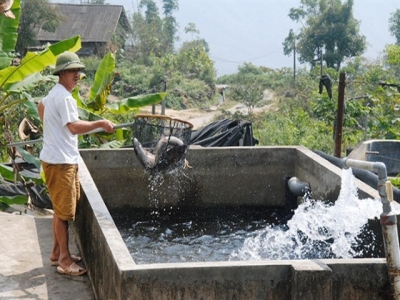Lao Cai - Developing agriculture with a sense of place

On July 17, Deputy Minister of MARD Phung Duc Tien led a working session with Lao Cai province on livestock production, seafoods, and animal disease prevention and management.
There are a growing numbers of cold-water fish farming facilities in Bat Xat.
Agri-specialties have a significant economic value
The province of Lao Cai shares an 182.086 km border with China, which carries a large amount of products, especially after the Noi Bai - Lao Cai highway opened.
According to the Lao Cai Department of Agriculture and Rural Development, the area contains 112,297 buffaloes, 21,703 cows, 325,189 piglets, 7,791 horses, and 5,045,000 birds. The entire amount of live meat for slaughter produced was 63,095 tons, while the total amount of eggs produced was 62,187 millions. More over half of the agricultural sector's structure was comprised of animal production. Livestock products mostly serve the requirements of the local population, with a small portion of the output being exported to neighboring provinces.
The province has 343 animal farms, with 110 of them producing high-value products with a yearly output value of VND 2 billion or more.
As of now, the province has about 250 cold-water fish farming facilities with a total farming volume of 57,100 m3 and an annual production of 670 tons; it is anticipated that the total output would reach 690 tons by the end of 2021.
A high number of animals and animal products are transported to and through the province as a result of the province's advantageous geographic position, posing a significant danger of disease transmission among animals. As a result, the province focuses its efforts on monitoring, regulating, and synchronizing actions to avoid hazardous illnesses such as avian flu, African swine fever, foot-and-mouth disease, lumpy skin, and rabies, among others. Additionally, the area increases the number of active and passive monitoring samples; continues to support and choose appropriate vaccinations and chemicals for the prevention and management of livestock and poultry diseases...
Increase the added value and sustainable development
Hoang Quoc Khanh, Deputy Chairman of the People's Committee of Lao Cai province, stated at the meeting that despite positive developments in the growth of regional livestock and seafood farming, the sector continues to face a number of challenges, including a weak connection in the chain linking production to consumption of new livestock and aquatic products; a small scale and unsustainable linkage; and a restriction on the application of high-tech equipment.
As a consequence, he recommended that MARD devote more resources to planning cattle production and developing a system of concentrated slaughtering facilities, as well as to products consumption and the development of cold-water seafoods policy, among other things.
To be eligible to participate in national livestock production and seafood farming development initiatives as well as disease control programs, schemes, and projects, the province requested funding allocations.
In response, Deputy Minister Phung Duc Tien said that the province of Lao Cai has excellent circumstances for the development of cattle and aquaculture industries. Many beneficial developments have occurred in the province's cattle, poultry, and aquatic product industries in recent years, highlighting the potential and benefits of the region.
It is necessary to develop a specific plan and master plan on reproducing structure of agriculture, including livestock sector, in order to implement the livestock development strategy for the period 2021-2025, with a vision to 2045, in Lao Cai with the goal of increasing added value and ensuring long-term development. In order to effectively plan, it is essential to clearly identify possible benefits, to concentrate on agricultural restructuring in accordance with a closed-loop system, and to have a long-term strategic vision.
Even while livestock development helps to speed up the expansion of the agricultural sector, it is also important to protect and promote the local cultural character.
Specifically, in terms of livestock disease prevention and control, he stated that Lao Cai must not be negligent; that the vaccination schedule for livestock must be accelerated; that the focus should be on traceability for typical local OCOP products; and that safe animal slaughtering facilities must be constructed.
Related news
 The rise of Ido longan in converted land
The rise of Ido longan in converted land In recent years, many farmers in Mekong river delta have boldly converted their gardens into growing Ido longan trees to get stable incomes.
 Mekong Delta expands sustainable and high-standard rice plant production areas
Mekong Delta expands sustainable and high-standard rice plant production areas Producing high-standard, merit, and added value rice plant adapting to climate change based on promoting the strengths, mobilizing the most effective resources.
 Hung Yen longan, agricultural products overcome Covid-19
Hung Yen longan, agricultural products overcome Covid-19 Apart from China, the traditional partner, others such as the US, Australia, and Japan all highly regard the potential of Hung Yen longan